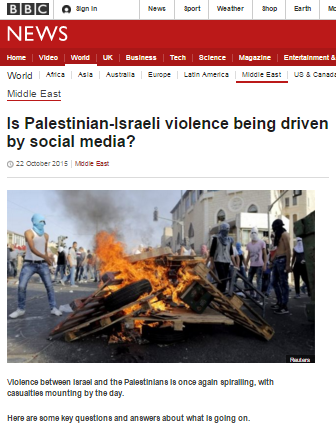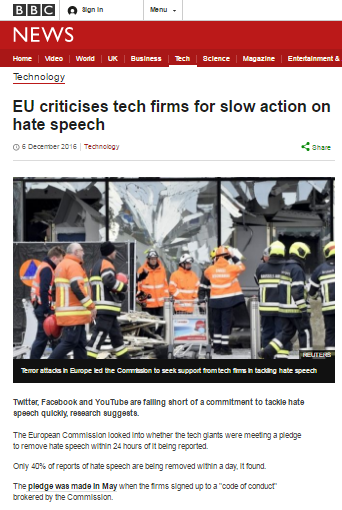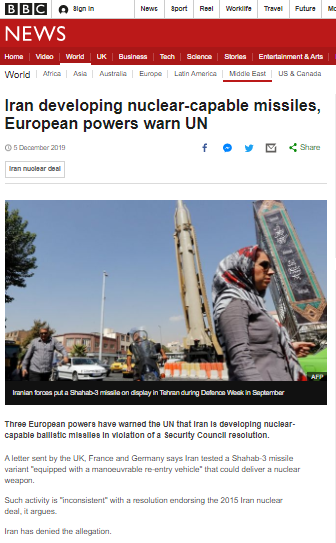In October 2015 the BBC News website produced a backgrounder which underwent extensive editing during the ten days following its original publication and is currently available online under the headline “Is Palestinian-Israeli violence being driven by social media?“.
As was noted here at the time, the backgrounder failed to provide BBC audiences with a comprehensive view of its purported subject matter.
“The question posed in its headline is addressed in a relatively small section of the report (fewer than 200 words) which actually does little to inform readers of the scale and significance of the role of incitement spread via social media in fueling the current wave of terror, of the kind of content appearing on such platforms or of the use of social media by official Palestinian groups other than Hamas – including Mahmoud Abbas’ Fatah party.”
Moreover, incitement to violence and glorification of terrorism on official social media accounts belonging to Fatah was downplayed in another section of the backgrounder: [emphasis added]
“The stabbing attacks seem to be spontaneous and although they have been praised by militant groups and supporters of Mahmoud Abbas’s Fatah faction on social media, Mr Abbas has said Palestinians are not interested in a further escalation.”
In July 2016 the BBC published two articles relating to the topic of Palestinian incitement of terrorism against Israelis on Facebook: “Israel angered by Facebook hatred rules“ and “Facebook sued by Israeli group over Palestinian attacks“. The first article opened with the following interestingly punctuated statement:
“Government ministers in Israel have accused Facebook of failing to tackle “inciteful” posts against the country on the social network.”
In the second of those reports the BBC found it appropriate to amplify a statement from Hamas:
“Hamas called the lawsuit an Israeli attempt to blackmail Facebook. […]
Sami Abu Zuhri, a Hamas spokesman in Gaza, accused Israel of trying to turn it [Facebook] into a spy tool against Palestinians. […]
“The real test for the owners of Facebook is to reject this pressure,” he said.”
Despite quoting a report by the Quartet which “identified “the spreading of incitement to violence on social media” by Palestinians as a key issue” (an aspect of the report downplayed in previous BBC reporting), the second article nevertheless used the frequently seen qualifying ‘Israel says’ formula to describe the links between incitement on social media and acts of violence.
“Israel says Palestinian incitement on social media has fuelled a wave of attacks since October, which have killed 35 Israelis and four people of other nationalities.
In October 2016, listeners to a programme broadcast on the BBC World Service relating to the Twitter hashtag ‘Facebook Censors Palestine’ were told:
“And this is really the problem: narrative. With two completely opposing views on events, what Israelis see as inciting violence, the Palestinians see as telling the truth and vice versa.”
To date – notwithstanding recognition of the issue by the Quartet and Facebook – the BBC has yet to provide its audiences with information which would broaden their understanding of the connection between official and unofficial Palestinian incitement and terrorism.
In contrast, on December 6th 2016 BBC Technology produced an article titled “EU criticises tech firms for slow action on hate speech“.
“Twitter, Facebook and YouTube are falling short of a commitment to tackle hate speech quickly, research suggests.
The European Commission looked into whether the tech giants were meeting a pledge to remove hate speech within 24 hours of it being reported. […]
The pledge was made in May when the firms signed up to a “code of conduct” brokered by the Commission.”
Notably, the BBC did not find it necessary to amplify statements made by those posting online hate speech and incitement in Europe suggesting that the monitoring and removal of such posts amounts to “a spy tool”.
In the link directing readers to the EU’s press release concerning the “code of conduct”, BBC audiences find the following:
“Vĕra Jourová, EU Commissioner for Justice, Consumers and Gender Equality, said, “The recent terror attacks have reminded us of the urgent need to address illegal online hate speech. Social media is unfortunately one of the tools that terrorist groups use to radicalise young people and racist use to spread violence and hatred. […]
Following the EU Colloquium on Fundamental Rights in October 2015 on ‘Tolerance and respect: preventing and combating Antisemitic and anti-Muslim hatred in Europe’, the Commission initiated a dialogue with IT companies, in cooperation with Member States and civil society, to see how best to tackle illegal online hate speech which spreads violence and hate.
The recent terror attacks and the use of social media by terrorist groups to radicalise young people have given more urgency to tackling this issue.”
Ms Jourova is also quoted twice in the body of the article itself:
‘”The last weeks and months have shown that social media companies need to live up to their important role and take up their share of responsibility when it comes to phenomena like online radicalisation, illegal hate speech or fake news,” said Justice Commissioner Vera Jourova in a statement. […]
“It is our duty to protect people in Europe from incitement to hatred and violence online,” said Ms Jourova. “While IT Companies are moving in the right direction, the first results show that the IT companies will need to do more to make it a success.”‘
Notably, the BBC did not find it necessary to qualify the EU’s statements describing such social media posts as incitement or to question the EU’s linkage between online hate speech and violence. Indeed, the caption to the image illustrating the article informs readers that:
“Terror attacks in Europe led the Commission to seek support from tech firms in tackling hate speech”
Neither did this report find it appropriate to portray racist posts on social media as “narrative” or to suggest to audiences that hate speech might be seen as “telling the truth”.
While Israel and the EU are both trying to tackle the problem of online hate speech and incitement to violence in similar ways, we see that the BBC’s approach to the story differs according to geography.
Related Articles:
Revisiting the BBC’s ‘explanation’ of the current wave of terror
Poor BBC reporting on Palestinian incitement again mars audience understanding




